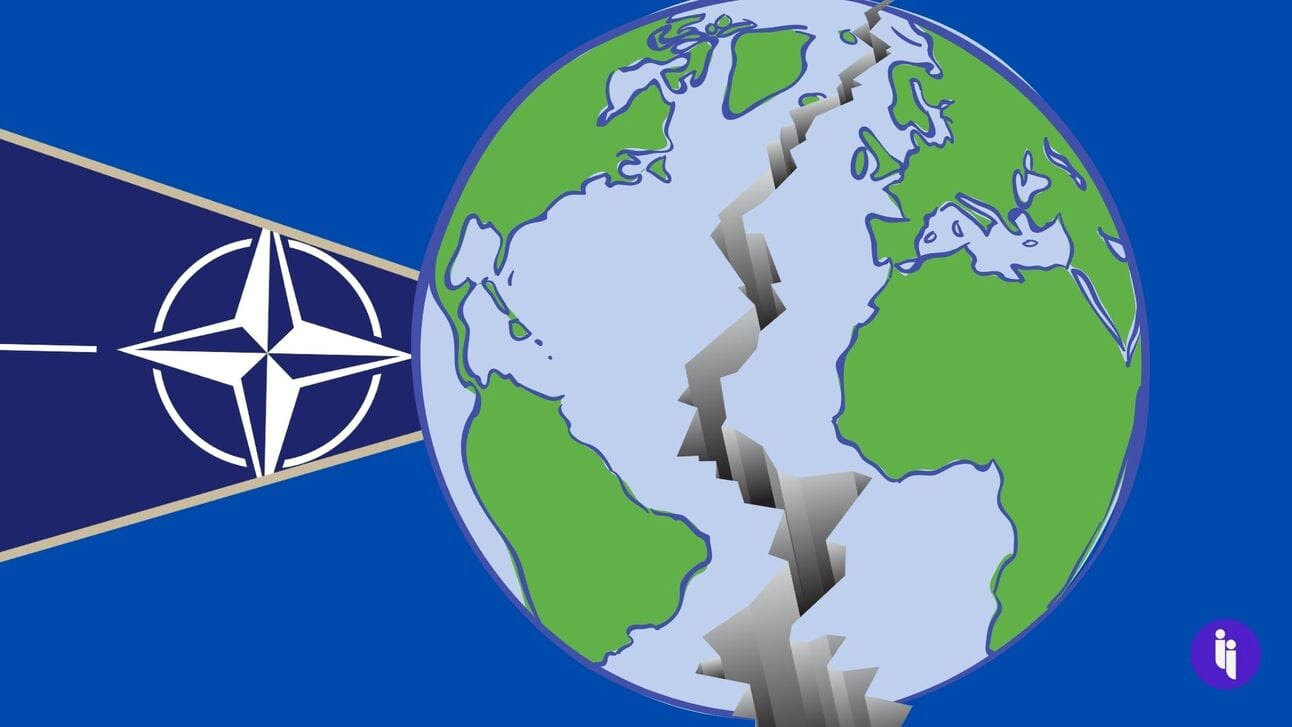The annual two-day North Atlantic Treaty Organization (NATO) summit wrapped in Washington yesterday (Thursday), bringing together generals, world leaders, diplomats and spies from NATO’s 32 states (plus some non-Atlantic tagalongs).
This year’s edition was a doozy — between the local heatwave that left delegates schvitzing, the evening downpours that left air shows cancelled, and the electoral intrigue that left onlookers holding their breath, the mood was fidgety. So here are the top five spiciest moments that caught our eye, and why.
- China the “decisive enabler”?
As is customary, NATO leaders dropped their annual Summit Declaration (both in English and French, naturellement) calling out what they see as the top challenges to the alliance and beyond: Iran, North Korea, Russia, and China.
Stay on top of your world from inside your inbox.
Subscribe for free today and receive way much more insights.
Trusted by 114,000+ subscribers
No spam. No noise. Unsubscribe any time.
But tucked in that hefty text was a nervy addition, labelling China as a “decisive enabler of Russia’s war against Ukraine”. NATO also accused China of “posing systemic challenges” through a) disinformation, b) new “activities” in space, c) expanding its nuclear arsenal, and d) coercive efforts to divide the alliance.
For context, last year’s Vilnius Summit also had a bone to pick with China, but it was more of a nudge, urging China “to act responsibly and refrain” from getting too cosy with its “no limits” pals in Moscow. And speaking of pals…
- Viktor does Miami
It’s unclear if Hungary’s Viktor Orbán met one-on-one with the summit host and US president, Joe Biden. He did, however, pop down to Florida yesterday to meet Biden’s rival for the White House, Donald Trump. Their private chat came days after Orbán paid surprise visits to the leaders of Ukraine, Russia, and China, and all while Trump continues to say he’ll end the Russo-Ukraine war in a day.
Turkey’s Erdogan also made headlines in an interview with Newsweek, criticising the West’s approach to Russia and beyond.
And speaking of making headlines…
- Biden’s candidacy
Yes, behind the photo-ops and signing ceremonies, the whispers among NATO delegates were around Biden’s future as the Democratic Party’s nominee.
Despite a strong speech on Tuesday evening, Biden’s performance – whether referring to Ukraine’s leader yesterday as “President Putin”, or referring to his own veep as “Vice President Trump” – won’t have put those whispers to rest.
Rather, the emerging (if still private) view among our NATO contacts is that Biden will be replaced as nominee, as party heavyweights pull their support.
And aside from the distractive potential of all that, it’s also created uncertainty for an alliance already hedging against two very different US election outcomes.
And speaking of hedging…
- Floor or ceiling?
Everyone’s also been talking about NATO defence spending targets this week:
- Who’s not meeting the 2% GDP target? A third of NATO’s members aren’t there yet (eg Canada, Croatia, Italy, Portugal, Slovenia and Spain).
- When might they hit it? Not soon. Canada’s PM just promised to reach 2% by 2032. Belgium is saying 2035. And so on.
- How will they get there? Estonia’s prime minister spelled out the question some NATO leaders are now asking: “Where can I spend? … Nobody’s selling to me now because they don’t have anything.”
- And is that 2% target even enough anymore? The most-spooked NATO members along Russia’s borders say ‘nope’ – Poland, Lithuania, Estonia and others want 2.5% or even 3% of GDP.
So NATO’s outgoing chief (Stoltenberg) declared this week that the 2% target is now the alliance’s “floor” not “ceiling”. But the final declaration ultimately fudged it: “in many cases, expenditure beyond 2% of GDP will be needed”.
And speaking of fudging…
- Ukraine’s “irreversible path”
This week’s NATO declaration says “Ukraine’s future is in NATO” and it’s on an “irreversible path” to membership. But as bold as that sounds, it’s functionally similar to last year’s declaration, which in turn just reiterated a commitment NATO made to Ukraine back in 2008: one day, it’ll be allowed to join the alliance.
INTRIGUE’S TAKE
A smug thing you can do at parties is to slip a French word into conversation, so here’s a good one: ‘denouement’ (pronounced ‘day-new-mon’).
It’s often translated as ‘resolution’ or ‘outcome’, and you might hear it used in English to describe the final act of a play or film, where all the plot strands finally come together to give that ending where everything makes sense.
The French word literally means ‘un-knotting’, and we mention that because this week’s NATO summit reveals the opposite – a world knotted up with unresolved questions:
- Will Biden be the nominee? If not, then who?
- Will a new nominee fare better? If not, then what’ll Trump 2.0 be like?
- Will the US sustain its global role? If not, then what’ll fill the void?
- Will Russia last in Ukraine? And how much more will China help?
And so on. When a world is knotted up like that, it tries to hedge for every outcome, and you can see this in each of today’s five NATO moments. Then, when the third act comes along, sometimes you get a relatively peaceful denouement, like we got at the end of the Cold War. But sometimes, you don’t.
Also worth noting:









